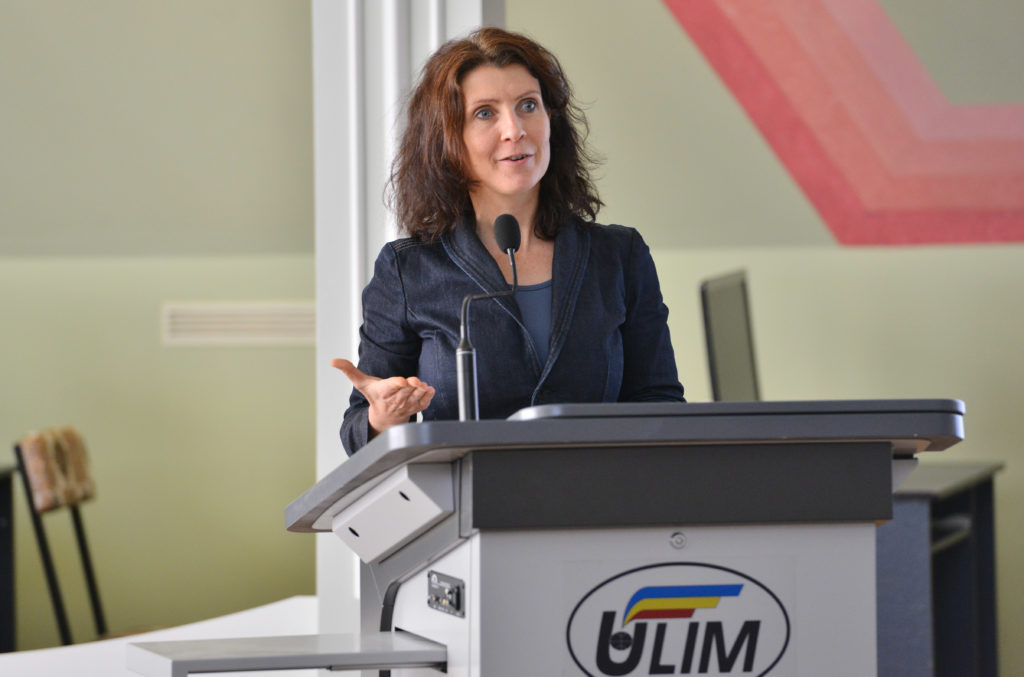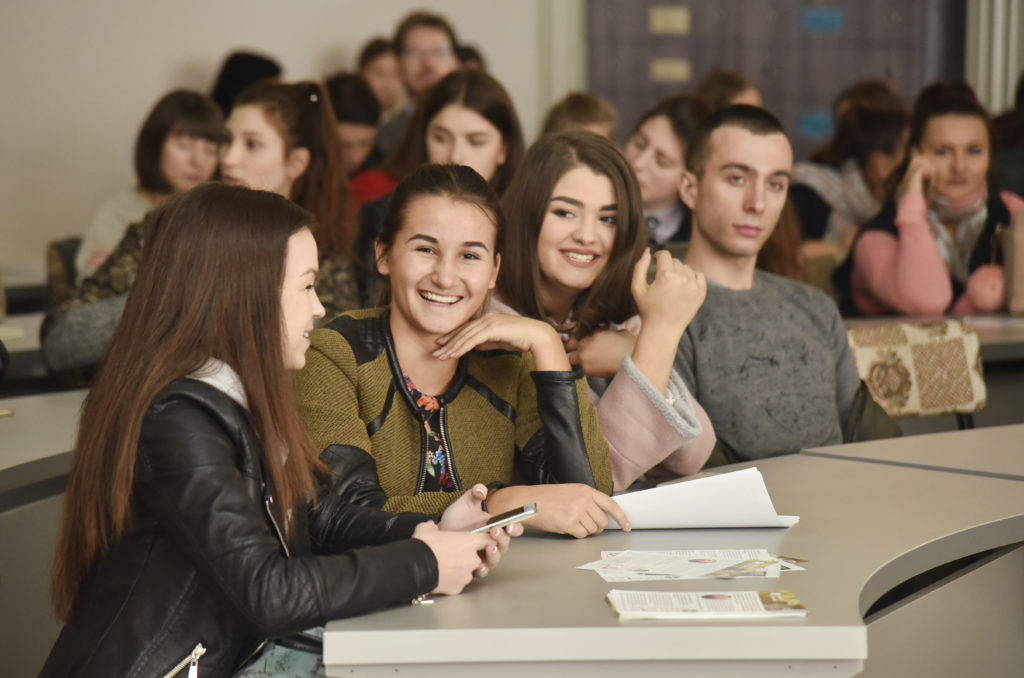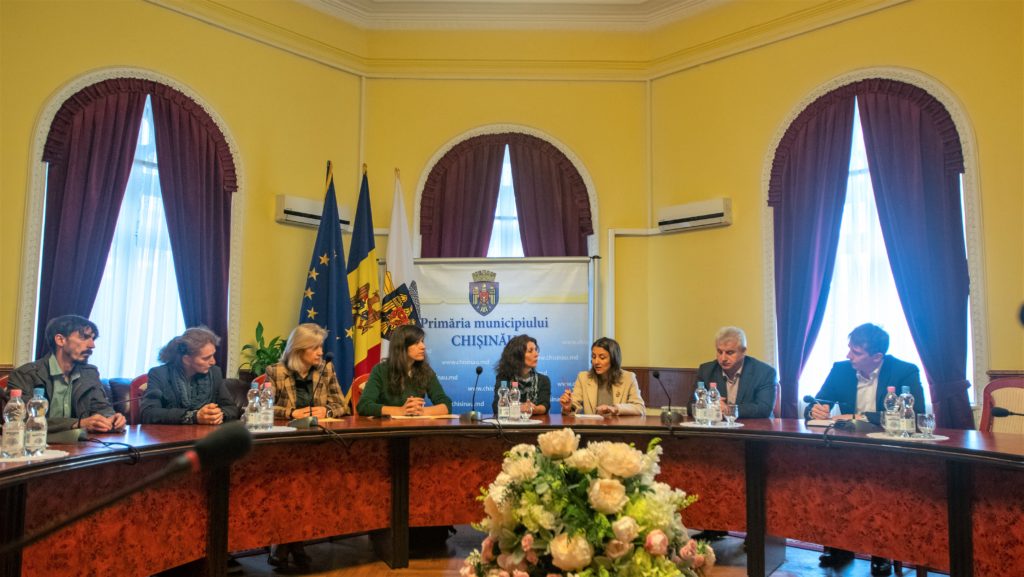El gobierno local de Moldavia promete ejercer una mejor política de bienestar animal para los protectores locales de animales, después de la visita de la parlamentaria holandesa Esther Ouwehand
Last weekend – for the first time in Moldova’s history – a lecture was given on the importance of animal rights. Dutch MP for the Party for the Animals Esther Ouwehand held the lecture at a university in the capital Chișinău, in a packed lecture hall. After that, Ouwehand talked with local animal protectionists and experts in the field of organic arable farming. The council of Chișinău promised Ouwehand that a professional centre for sterilisation and vaccination of stray animals will soon be opened.

The lecture was held at the invitation of animal rights lawyer Ion Dron. During her lecture, Esther Ouwehand pictured how the efforts made for the welfare of animal also benefit people. She showed that society needs to be more connected with nature and that it should be led by compassion.
After the lecture, Ouwehand talked with several animal protectionists, who all pointed out the lack of regulations and legislation for the protection of animals in Moldova. Lawyer Dron wrote a legislative proposal in cooperation with a Moldovan NGO, which proposal is to legally enshrine the adequate protection of animals. Animal protectionists are now fighting together for adoption of this legislative proposal by the Moldovan Parliament.
Ouwehand was impressed by the many brave people in Moldova who dare to stand up for the interests of animals. And they do so quite successfully: animal protectionists’ protests helped to close down the dolphinarium of Chișinău . Also, a first step was taken against animal abuse by making cruelty against animals punishable in the Moldovan Penal Code.
Ouwehand: “Choosing the interests of the vulnerable instead of the right of the strongest can be done close to home too. The cruel treatment of (stray) animals is not acceptable in a civilised country. And we are so happy to see that here in Moldova brave people are standing up for the interests of animals and with that for the Moldovan people themselves. Wonderful!”

Agriculture
Ouwehand praised the fact that Moldova is doing relatively well within the region in the field of organic arable farming, where nutritious crops are grown, such as walnuts, fruit, beans and sunflower pits. However, she warned for the growing lobby of foreign companies to expand industrial livestock farming in Moldova. Now that the Western livestock industry is suffering a crisis and people in the West are less tolerant of the industry destroying their living environment, it sees opportunity to move its polluting practices to Eastern-Europe.
Ouwehand: “Moldova is well capable to provide food for the future: it has fertile soils and a great variety of crops, as a result of which a natural resistance against insects and plagues can be cultivated. Agriculture without overfertilisation and pesticides, with plenty of vegetable proteins for human consumption: that is what Europe needs. We hope that Moldova will not make the same mistake as the West did and will oppose to importing Western livestock practices, as this would mean a disaster for Moldova’s nature, animals, people and the environment.
Municipal policy

Moldovan animal protectionists told Ouwehand that local governments do very little to achieve animal welfare and that they even actively participate in the cruel approach of stray animals by facilitating so-called “Killing Stations”. That is why Ouwehand, together with animal protectionists, talked with the political advisor of the Mayor of Chișinău.
The council admitted that a lot can be improved in the area of animal welfare policy. The Mayor’s advisor then promised that the council will start to conduct an animal-friendly stray animals policy soon. The first step towards this is the opening of a professional centre for the sterilisation of stray dogs, where 50 dogs can be looked after and treated according to European standards. Ouwehand told the Mayor’s advisor that she will follow the progress through the local animal welfare organisations.
During the meeting with the council, animal rights lawyer Dron again emphasised why an appropriate animal welfare policy is essential: “Animal welfare is not only important for animals, but also for the entire society. An inadequate animal welfare policy will harm our society as a whole.”
El pasado fin de semana, por primera vez en la historia de Moldavia, se dio una conferencia sobre la importancia de los derechos de los animales. La miembro holandesa del Parlamento para el Partido por los Animales, Esther Ouwehand, dio la conferencia en una universidad en Chişinău, en una sala de conferencias repleta. Despues de la conferencia Ouwehand habló con proteccionistas locales de animales y con expertos en el campo de la agricultura orgánica cultivable. Desde el municipio de Chişinău, Ouwehand recibió la promesa de que pronto se abririera un centro profesional de esterilización y vacunación de animales callejeros.

La conferencia tuvo lugar por invitación de Ion Dron, abogado de derechos de los animales. Esther Ouwehand ilustró durante su conferencia cómo el compromiso con el bienestar de los animales es también un compromiso con las personas. Ella mostró la necesidad de una sociedad más conectada con la naturaleza y guiada por la compasión.
Después de la conferencia, Ouwehand habló con varios protectores de animales. Todos confirmaron una falta de una legislación y regulaciones que protegen a los animales en Moldavia. El abogado Dron, en colaboración con una ONG moldava, redacto un proyecto de ley que debería incluir la protección adecuada de los animales en la ley. Los protectores de animales ahora están luchando juntos para que este proyecto de ley sea adoptado por el Parlamento moldavo.
Ouwehand quedó impresionada por la gran cantidad de personas valientes en Moldavia que se atreven a defender los intereses de los animales. Y lo hacen con éxito: tambien gracias a las protestas de los protectores de animales, se cerro el delfinario de Chişinău. Asimismo se tomo el primer paso contra la crueldad animal al criminalizar la crueldad contra los animales en el Código Penal.
Ouwehand: «Optar por os intereses de los vulnerables en lugar del derecho de los más fuertes también puede estar cerca a la casa. Los tratos crueles con animales (extraviados) no pertenece a un país civilizado. Y estamos muy felices de ver que aquí, en Moldavia, personas valientes se ponen de pie para defender los intereses de los animales y, con eso tambien para los propios moldavos. ¡Genial! »

Agricultura
Ouwehand elogió el hecho de que a Moldavia le va relativamente bien en la región en el campo de la agricultura orgánica, donde e cultivan scultivos nutritivos como nueces, frutas, frijoles y las semillas de girasol. Sin embargo, advirtió contra el creciente lobby de las compañías extranjeras para expandir la ganadería industrial en Moldavia. Ahora que la industria ganadera occidental está en crisis y la gente del Occidente se nota cada vez menos tolerante porque la industria está destruyendo su medio ambiente, la industria ve oportunidades para trasladar sus prácticas contaminantes hacia Europa del Este.
Ouwehand: «Moldavia tiene todo para cultivar la comida del futuro: suelos fértiles y una gran variedad de cultivos, lo que permite crear una resistencia natural a los insectos y las plagas. Una agricultura sin exceso de fertilización y veneno agrícola, con muchas proteínas vegetales para el consumo humano: eso es lo que Europa necesita. Esperamos que Moldavia no comete los mismos errores que hacen el Occidente y se opone a la importación de prácticas industriales ganaderas occidentales, lo que significaria un desastre para la naturaleza de Moldavia, los animales, los seres humanos y el medio ambiente «.
Política municipal

Los protectores de animales moldavos contaron que los gobiernos locales hacen poco por el bienestar animal e incluso participan activamente en un acercamiento cruel a los animales callejeros, facilitando entre otras cosas, las llamadas «Perreras de la Muerte». Es por eso que Ouwehand, junto con los protectores de animales, habló con el consejero político del alcalde de Chişinău.
El gobierno municipal reconoce que todavía hay mucho por mejorar en el área de la política de bienestar animal. Entonces, el consejero del alcalde prometió que el municipio pronto introduciría una política de animales callejeros amigable con los animales. El primer paso para lograrlo es la apertura de un centro profesional de esterilización de perros callejeros, en el que 50 perros pueden ser recolectados y tratados según los estándares europeos.
El gobierno municipal también prometió que los automóviles en los que se transporten los animales callejeros se harán mas aceptables para los animales antes de la apertura del centro equipándolos, entre otras cosas, con buenas jaulas y un sistema de ventilación. Ouwehand hizo saber al asesor del alcalde que seguira el proceso a través de las organizaciones locales de animales.El abogado defensor de los derechos de los animales
En la reunion, el abogado para los derechos de animales, Dron enfatizó nuevamente durante la reunión con el gobierno municipal, porque sera necesaria una buena política de bienestar animal: «El bienestar animal no solo es importante para los animales, sino también para toda la sociedad. La mala política de bienestar animal perjudica a nuestra sociedad en general «.